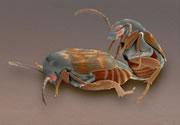 Sex can keep a female bean weevil spritely.© SPL
Sex can keep a female bean weevil spritely.© SPLEver think your spouse is turning you grey before your time? Well things are very different for a beetle being studied by Swedish evolutionary biologists. They have found that some male bean weevils can slow down the ageing process in their mates simply by having sex with them.
Female weevils (Acanthoscelides obtectus) live longer when mated with males that have been bred to reproduce later in life, report researchers at Uppsala University. By supplying a cocktail of age-defying chemicals with their sperm, the males stop their mates dying off before they have had the chance to produce a large family.
"The males are promoting their own selfish interests by being the good guys in this case," explains Göran Arnqvist, a member of the study team. "It benefits males if their mates live longer."
Best of both
It's a surprising finding, because reproduction is generally thought to accelerate the ageing process. Castrated male mice, for example, live longer without the body-ravaging side effects of testosterone. Ensuring that your genetic legacy is preserved in future generations can be a costly, tiring business.
In general, ageing is not thought to be subject to strong evolutionary forces, because old age sets in after offspring have already been produced and genes already passed on. Genes that leave you weak and frail at 70 are unlikely to be weeded out if you have kids at 30.
But there are some situations where both reproduction and longevity are possible, as the Swedish researchers have discovered.
Magic ejaculate
The team studied weevils that had been raised in the lab to breed either early or late in life. The early-breeding strain was developed by giving weevils free access to the beans inside which their larvae must develop. A late-breeding strain was created by denying the weevils any beans until a mating pair had already been together for ten days. After many generations, the bugs evolved to deal with these conditions.
When males from these different strains were paired with normal females, the females that were mated with late-breeding males lived significantly longer: 18.7 days on average, compared with 17.9 for females matched with early breeders. The researchers report the results in Proceedings of the Royal Society B1.
It is not yet clear exactly how the males are prolonging their mates' lives, admits Arnqvist. He suspects that there is a magic ingredient in their ejaculate that boosts the females' health and vigour. But he says, "insect ejaculates are a soup of proteins and peptides that are immensely complex."
Unusual to be lucky in love
ADVERTISEMENT
Whatever the mystery ingredient, the early breeders do not bother supplying it because they don't have to, Arnqvist explains. Because the females reproduce straight away the male still gets to be a dad, even if his mate dies young.
Several early-breeding insects will even shorten the lifespan of their mates in their competition to capture females. The male fruitfly Drosophila, for example, produces a protein in its semen that makes it more difficult for other males to fertilize the same female; this chemical also happens to be toxic2.
This unfortunate side effect is an example of the more usual situation, where sex is a game of give and take. The lucky mates of late-breeding bean weevils, who get both a long life and good sex, are probably an unusual case.
